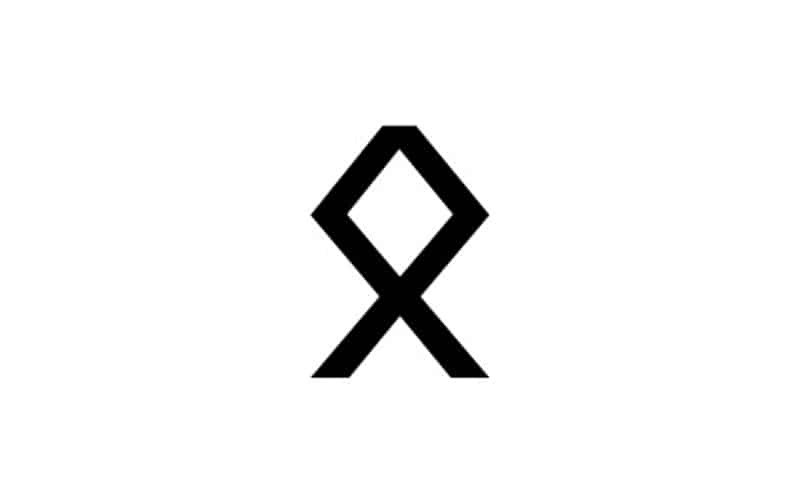As we journey through the Elder Futhark, we find ourselves at the end of the runic alphabet with the Othala rune. This ancient symbol, carved by the Vikings, holds a wealth of knowledge and symbolism that we’ll explore together.
Othala Background and Description
The Elder Futhark, a runic system that predates the Viking Age, is a fascinating subject. It’s like a time capsule, preserving the thoughts and beliefs of our ancestors. Among these runes, Othala holds a special place. It’s the last rune in the Elder Futhark sequence, following Dagaz. The name ‘Othala’ in Old Norse translates to ‘heritage’ or ‘ancestral property’, symbolizing the connection to our ancestors and our roots.
The Elder Futhark, as archaeological evidence suggests, found its use across a broad geographic range, extending from Scandinavia to continental Europe. Like its sibling runes, craftsmen etched the Othala rune into stone, wood, and metal, using it as a means of communication and a tool for magic.
The etymology of ‘Othala’ is interesting. It stems from the Proto-Germanic word ‘ōþalą’, which means ‘heritage’ or ‘estate’. This is a testament to the rune’s symbolic association with ancestral property and inheritance.
Graphical Representation

The Othala rune is visually simple, yet striking. It resembles a diamond where the bottom lines extend, giving it a firm platform. This design is thought to symbolize a homestead or a piece of land, reflecting the rune’s meaning of heritage and property.
Historically, the design of the Othala rune has remained fairly consistent. However, some variations exist, such as the rune being drawn with curved lines instead of straight ones. These variations, though minor, add to the rich tapestry of runic history.
Phonetic Value
In the Proto-Germanic language, the Othala rune represented the ‘o’ sound. As the Germanic languages evolved, this phonetic value remained largely consistent. Whether you’re speaking Old Norse, Old English, or Gothic, the Othala rune will still represent the ‘o’ sound.
Symbolic Meaning of the Othala Rune
The Othala rune is a symbol of heritage, but its meaning goes beyond the literal concept of property. It represents the connection to our ancestors, our roots, and our past. In the context of the Proto-Germanic language, the term ‘ōþalą’ or ‘heritage’ likely referred to the ancestral property passed down through generations.
In modern Norwegian, we still have the term ‘Odel’ (derived from Othala). This is the term used for the first borns’ right to inherit farm land the family owns and is law.
There are no specific gods or goddesses directly associated with the Othala rune in the Norse pantheon. However, its themes of heritage and ancestry could be loosely associated with the Allfather, the wise Odin, who values wisdom and knowledge, including that of our ancestors.
The Aett and its Symbolism
The Othala rune belongs to the third aett of the Elder Futhark, also known as Tyr’s aett. This aett is named after the god of justice and law, Tyr, and it carries themes of balance, order, and right action.
The third aett is the last of the three aettir in the Elder Futhark, and it represents the final stage of a journey or process. The Othala rune, as the last rune in this aett, symbolizes the culmination of this journey. It’s the moment of enlightenment that comes after a long period of struggle and growth.
Tyr, the god associated with this aett, is a figure of justice, law, and righteous warfare in Norse mythology. His themes of balance and order resonate with the Othala rune’s symbolism of heritage and ancestral connection.
Elder Futhark Quiz
Do you want to test your knowledge of Elder Futhark runes? Then this quiz is perfect for you!
Don’t forget to play our other games as well!
Othala Used in Divination and Magic

While I don’t personally believe in divination or magic, I find the historical and cultural practices surrounding these topics fascinating. Like other runes, it is likely that the Othala rune held a specific meaning when used in runic divination and magic.
In divination, the Othala rune could signify a connection to one’s roots or a return to familiar ground. It might suggest that the seeker is on the verge of a significant realization or change.
People could use the Othala rune in magic, particularly for spells or charms to protect their home or property. Often, people associate the concept of heritage, represented by Othala, with safety and the preservation of tradition.
Othala in the Younger Futhark – The Lost Heritage
As the Elder Futhark evolved into the Younger Futhark, also known as Norse runes, around the 7th and 8th centuries, Othala, representing heritage or ancestral land, was lost. Its disappearance signifies a shift in the expression and understanding of heritage, inheritance, and the connection to one’s roots.
Frequently Asked Questions
The Othala rune symbolizes heritage, ancestral property, and connection to one’s roots.
The Othala rune represents the ‘o’ sound in the Proto-Germanic language and its descendants.
The Othala rune belongs to the third aett of the Elder Futhark, also known as Tyr’s aett.
Featured Image Credit: Ekirahardian, OFL, via Wikimedia Commons
